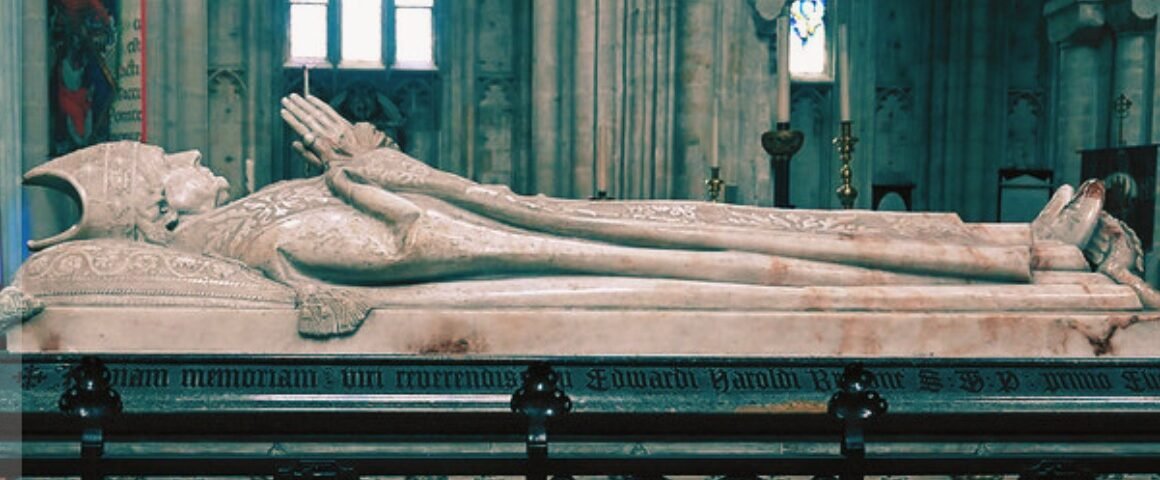In his review of Bishop A. P. Forbes’s An Explanation of the Thirty-Nine Articles—a new edition of which was recently published by Nashotah House Press—Gerald McDermott compares Forbes’s work to that of Edward Harold Browne and finds the former “deeper and richer,” with Browne being “decidedly Protestant in his approach, while Forbes is reformed catholic.” Putting aside the judgment that Browne’s engagement with the Articles is inferior, to call Forbes “reformed catholic” is a total misappropriation of that term, and one that is likely to mislead unfamiliar readers. In order to understand McDermott’s thinking and respond adequately, though, some background is required.
To begin with, McDermott affirms that Anglicanism, properly understood, is a via media (“middle way”) between Rome on the one hand and Geneva—or rather, Protestantism more broadly—on the other. As he puts it, “We are reformed catholic Anglicans, neither Protestant nor Roman Catholic.”[1] He cites John Keble in support of this idea, noting that Keble “referred to the middle way between Protestantism on one side and Roman Catholicism on the other.”[2] This historiographical reading of the Anglican Church’s identity has been out of vogue with scholars for decades,[3] but McDermott continues to adhere to it. Consequently, he refuses to grant that Anglicanism is in any sense Protestant, writing, “Deep Anglicans are not Protestant.”[4] Moreover, notwithstanding his statements that Anglicans are “not anti-Protestant”[5] and not “forever hostile to”[6] Protestantism, it is difficult to avoid the impression that he holds some aversion to the label: “The word ‘Protestant’ suggests that the proper attitude is to protest all things Catholic or Orthodox.”[7] It is Protestants, he says, who errantly “glory in sola scriptura,” believing that “all I need is the Bible to understand and follow Christ—me and Jesus and the Bible.”[8] And he wants to be sure everyone knows that “nowhere in the prayer book is the word ‘Protestant’ used.”[9]
This seeming antipathy toward the label of “Protestant” leads McDermott to use the term “reformed catholic” in a way that is completely out of step with older usage. Historically, “reformed catholic” has been a synonym for “Protestant,” albeit one that lends greater emphasis to the acceptance of that which is truly catholic.[10] Indeed, in the case of many Anglican divines, “The terms [“Protestant” and “Catholic”] are used together: Protestant-Catholic, Reformed Catholic, etc.”[11] Understood in this sense, “reformed catholic” cannot plausibly be applied to Forbes, as should be apparent from the numerous un-Protestant positions he maintains in his commentary on the Articles, such as asserting that they “cannot satisfy the pure Calvinist…however often they are ignorantly claimed for them”;[12] ascribing the absence of personal sin (not to say original sin) to the Virgin Mary;[13] accepting the Roman “distinction between deadly and venial sin, with all the consequences of that distinction”;[14] averring that the souls of the faithful departed undergo “the fire of suffering and the water of affliction” before they are brought into “a wealthy place”[15]; affirming Eucharistic “circumgestation [i.e., procession], elevation, and adoration” to be not prohibited;[16] and abominating Calvin’s doctrine of Eucharistic presence, which is often held to be affirmed by Article XXVIII, as an “inanity.”[17] It should therefore be clear that when McDermott says Forbes is “reformed catholic,” he is using the word “reformed” in a highly idiosyncratic manner, as here it appears to mean “dissenting from Rome in a way that is not at all Protestant.” Of course, in an Anglican context, the customary word for someone who is catholic but dissents from Rome in a decidedly non-Protestant way is “Anglo-Catholic,” which is precisely the term McDermott expressly declines to use to describe Forbes. It is not evident why McDermott does this—one possible reason is that when someone is identified as “Anglo-Catholic,” that person is more likely to be dismissed as not being truly Anglican, whereas the term “reformed catholic” does not invite such controversy. Yet understandable as the motivation to deflect criticism may be, the fact remains that in applying the term “reformed catholic” to Forbes, it is evacuated of its historic meaning.
In closing, Browne is indeed Protestant in his approach to the Articles. To be more precise, he is a reformed catholic type of Protestant—that is to say, he is mindful and appreciative of the catholic heritage that underlies the sort of theologically and spiritually sound Protestantism articulated in his Exposition of the Thirty-Nine Articles. Forbes, on the other hand, is a straightforward example of what has typically been referred to as an Anglo-Catholic. Whatever contributions he and others like him have made to the Anglican tradition—and they are real, so Clinton Collister is to be thanked for bringing this reprint of Forbes’s work to fruition—characterizing such figures with a term that cannot rightly be applied to them does no good, but rather only serves to deepen confusion and misunderstanding in the ongoing discussions over Anglican identity.
Notes
- Gerald McDermott, Deep Anglicanism, 2nd ed. (Nashotah, WI: Nashotah House Press, 2024), 22. ↑
- McDermott, Deep Anglicanism, 13. Compare John Henry Newman, “Via Media No. II” [Tract 41], in Tracts for the Times, vol. I, 3rd ed. (London: Gilbert & Rivington, 1842), 6. ↑
- See, e.g., Dewey D. Wallace, Jr., “Via Media? A Paradigm Shift,” Anglican and Episcopal History 72, no. 1 (March 2003): 2‒21; Oliver O’Donovan, On the Thirty-Nine Articles: A Conversation with Tudor Christianity, 2nd ed. (London: SCM Press, 2011), 8; and Anthony Milton, “Attitudes towards the Protestant and Catholic Churches,” in The Oxford History of Anglicanism, Volume 1: Reformation and Identity, c.1520-1662, ed. Anthony Milton (New York: Oxford University Press, 2017), 333. ↑
- McDermott, Deep Anglicanism, 21. ↑
- McDermott, Deep Anglicanism, 21. ↑
- McDermott, Deep Anglicanism, 16. ↑
- McDermott, Deep Anglicanism, 19. ↑
- McDermott, Deep Anglicanism, 19. ↑
- McDermott, Deep Anglicanism, 222. ↑
- See, e.g., Roger L’Estrange, The Reformed Catholique, or, The True Protestant (London: Henry Brome, 1679), and William Perkins, A Reformed Catholic (Moscow, ID: Canon Press, 2021). ↑
- Derrick Hassert, “Anglicanism: Reformed Catholicism, Protestant and Catholic,” The North American Anglican, 29 November 2021, https://northamanglican.com/anglicanism-reformed-catholicism-protestant-and-catholic/, italics original. See also Adam M. Carrington, “The Catholic Faith Once Delivered, Then Recovered: A Response to Fr. Wilgus,” The North American Anglican, 16 August 2023, https://northamanglican.com/the-catholic-faith-once-delivered-then-recovered-a-response-to-fr-wilgus/, and Charles Erlandson, “Is Anglicanism Catholic or Protestant?” The North American Anglican, 8 September 2023, https://northamanglican.com/is-anglicanism-catholic-or-protestant/. ↑
- A. P. Forbes, An Explanation of the Thirty-Nine Articles, 2nd ed. (Oxford and London: James Parker and Co., 1871), viii. McDermott himself approvingly remarks that Forbes “demonstrates that the Articles, while influenced by the Reformed tradition, break from significant staples of that tradition,” such as irresistible grace and the perseverance of the saints. It is not easy to see how this comports with his older comment that “we should accept our Calvinist Anglican brothers and sisters as good Anglicans” (“The Via Media—Between What and What?” The North American Anglican, 17 May 2020, https://northamanglican.com/the-via-media-between-what-and-what/). ↑
- Forbes, Explanation, 223‒24. Luther has been cited as sharing this belief, but it did not carry over into later Lutheranism or Protestantism more broadly. ↑
- Forbes, Explanation, 237. ↑
- Forbes, Explanation, 348. ↑
- Forbes, Explanation, 568. ↑
- Forbes, Explanation, 501‒502. ↑







'The Meaning of “Reformed Catholic”: A Response to Gerald McDermott' have 2 comments
October 14, 2024 @ 11:13 pm Christian Fredrickson
This is an excellent article, thank you
October 19, 2024 @ 4:14 am Rhonda C. Merrick
Clark notes, “when someone is identified as ‘Anglo-Catholic,’ that person is more likely to be dismissed as not being truly Anglican.” This has gone on for many decades. A friend whose father was an Episcopal priest and an Anglo-Catholic, about 20 years ago told me stories of bias against Anglo-Catholics on the part of ECUSA bishops going back to the middle of the 20th century and earlier, even in the Midwest. Priests like her father were shunted off to the rural, small town parishes. This probably accounts for the fact that dioceses with large cities were the first to fall to the errors of modernism and postmodernism, while the dioceses with only small cities were able to hold the line against the unbiblical changes which culminated in the formation of the ACNA.